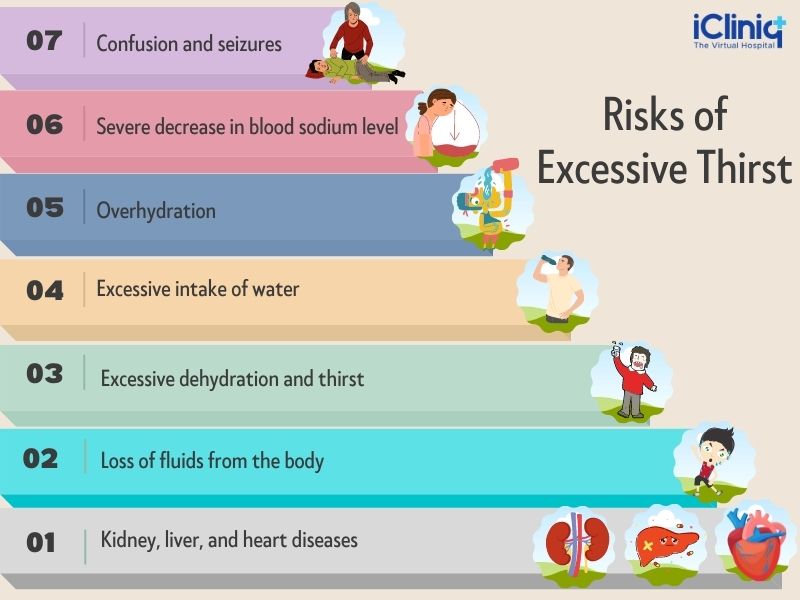Introduction
Thirst is the sensation felt by the body when there is a requirement of water for the body or when there is dryness. Consumption of spicy foods, performing exercises, hot weather, etc., can make us feel thirsty and that is considered to be normal. If someone feels excessively thirsty even after drinking fluids, it can indicate an abnormality in the body. Sometimes, it may also accompany fatigue and blurring of vision.
What Can Cause Excessive Thirst?
There can be normal as well as pathologic causes and they have been mentioned below:
-
Certain diseases.
-
Consumption of spicy or salty foods.
-
Too much exercise or strenuous physical work.
-
Vomiting.
-
Loose motions.
-
Burns in the body.
-
Excess blood loss.
-
Some medicines like Lithium, antipsychotics, diuretics, etc.
If someone experiences thirst very often, then this has to be related to some underlying medical condition. The following could be the possible explanations or causes for the same;
-
Dehydration
This happens when there is inadequate intake of water or excessive loss of fluid from the body. This can alter body functions. Severe dehydration can be dangerous as it can prove to be fatal also. More focus should be given to infants and young children. The various causes for dehydration could be illness, increased sweating, a lot of urine excretion, diarrhea, or vomiting.
-
Diabetes Mellitus
It is a clinical condition characterized by deficiency of insulin or inadequacy of the body to produce or utilize insulin. A patient suffering from diabetes can face increased thirst which could be due to increased blood sugar (hyperglycemia) levels in the body. It is one of the more commonly observed symptoms in diabetic patients.
-
Diabetes Insipidus
This is the type of diabetes that occurs when the body is not able to regulate the fluid levels in the body properly. This leads to an imbalance as well as loss of water in the body which ultimately causes excessive urination and thirst.
-
Dipsogenic Diabetes Insipidus
This is a clinical condition characterized by a thirst mechanism defect in the body that causes an increase in thirst leading to increased liquid intake and frequent urination.
-
Various conditions like heart, liver, and kidney failure.
-
Sepsis
It is a life-threatening condition caused by a severe inflammatory reaction due to bacterial or other infections.
How Can It Be Diagnosed?
When you consult your physician, they may ask you about your past medical history, personal information, family history, etc., along with the signs and symptoms being faced by you. You may be asked questions regarding frequency of urination, intake of water, feeling of thirst, any other associated health problems, etc.
Following that, a physical examination may be performed. Also, certain laboratory tests may be required to confirm the diagnosis. Following are the more commonly done tests:
-
Analysis of urine including urine osmolality and urine electrolyte tests.
-
Various blood tests may include a blood count and blood differential tests.
-
Serum tests like serum electrolyte and osmolality tests.
How Can It Be Treated?
The treatment depends on the underlying medical condition. If it is due to diabetes, then medications may be prescribed to control diabetes along with adequate intake of water and food. If it is psychological, then behavioral therapy may be considered. If it is due to medications, then an alternative for those medications can be prescribed. Apart from these, lifestyle changes, dietary patterns, etc., may be modified to get better results.
What Is the Normal Level of Water Intake?
An adequate amount of water, especially 2.5 to 3 liters should be consumed in a day to remain healthy. You can also enhance the water intake by consumption of various water-rich foods which are as follows:
-
Celery.
-
Oranges.
-
Melons.
-
Watermelon.
-
Tomatoes.
-
Fibrous foods.
You can check your urine to assess the adequate intake of water. Light-colored, high-volume urine without any heavy odor indicates adequate consumption of water.
Water is essential for various functions of the body. All the body parts, including organs, tissues, and cells need it to function properly. Following are the basic functions of water in the body:
-
Lubrication and cushioning of the joints.
-
Maintaining a normal body temperature.
-
Protection of the brain and spinal cord.
-
Excretion of body waste by perspiration, urination, and movements of the bowel.
The following conditions indicate that you should consume more water:
-
Diarrhea.
-
Hot weather.
-
Excessive or strenuous physical activity.
-
Vomiting.
Are There Any Risks of Excessive Thirst?

Yes, when you have excessive thirst, you may consume excessive water without adequate excretion which can lead to overhydration. The various causes can be excessive consumption of water to compensate for normal or pathologic loss of fluids from the body. Even diseases of the kidney, liver, or heart can cause it. Overhydration can lead to a severe decrease in blood sodium level which can result in confusion and seizures, more commonly if it develops suddenly.
When Should I Seek Medical Advice?
Thirst indicates that the body has fewer fluids. But, if thirst remains constant and does not settle down even after drinking fluids, it can be associated with an underlying condition. It could be physical or psychological.
Following are the indications to seek medical advice:
-
Persistent thirst even after consumption of a high amount of water.
-
Tiredness associated with thirst.
-
Associated blurred vision, increased hunger, or any wound that is not healing.
-
Excessive urination which may be more than 2.5 liters in a day.
Conclusion
Excessive thirst, as mentioned above, could be normal or pathologic. It is important to talk to your physician if you have constant excessive thirst as it can turn into a severe condition if not managed on time. Hence, early diagnosis is important. Online medical platforms have made this consultation process easy as doctors are just a click away. To know more about this condition, consult a physician or specialist online.













